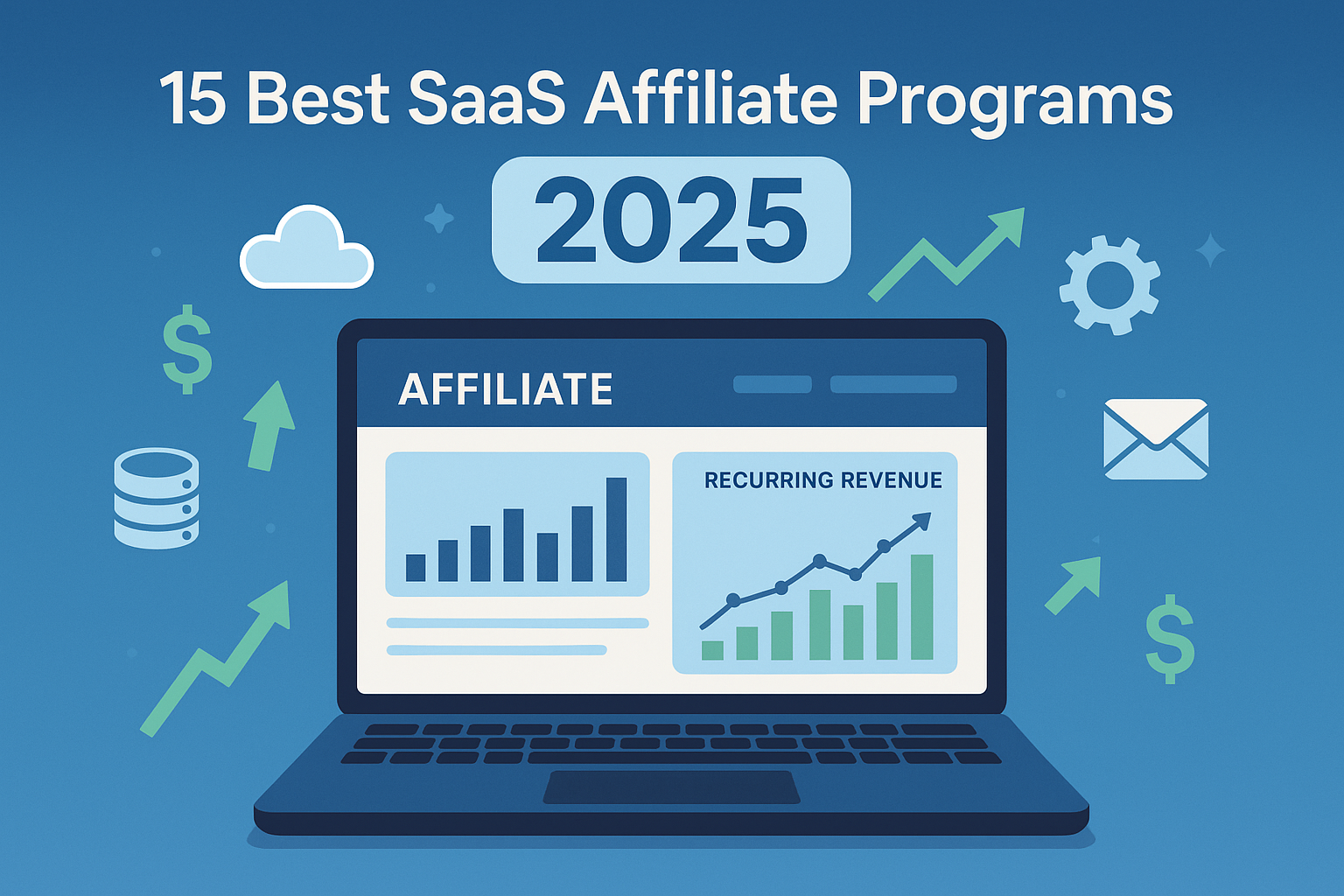The software-as-a-service industry has revolutionized how businesses operate, and with it, SaaS affiliate programs have emerged as one of the most lucrative opportunities for affiliate marketers in 2025. Unlike traditional affiliate marketing that offers one-time commissions, recurring commission affiliate programs in the SaaS space provide the potential for long-term passive income streams that can generate revenue for months or even years from a single referral.
The appeal of software affiliate marketing lies in its unique value proposition. When you successfully refer a customer to a SaaS platform, you don't just earn a commission once—you continue earning as long as that customer maintains their subscription. This subscription-based affiliate program model has transformed the affiliate marketing landscape, offering marketers the opportunity to build sustainable, predictable income streams.
In this comprehensive guide, we'll explore the 16 best SaaS affiliate programs available in 2025, examining their commission structures, cookie durations, and unique selling propositions. Whether you're a seasoned affiliate marketer or just starting your journey in B2B SaaS affiliate marketing, this article will provide you with the insights and strategies needed to succeed in this rapidly growing sector. You can also check Reditus, they focus purely on SaaS affiliate programs and have over 100+ programs you can join via their affiliate program marketplace.
Why SaaS Affiliate Programs Dominate in 2025
The dominance of SaaS affiliate programs in 2025 isn't accidental—it's the result of fundamental shifts in how businesses consume software and how affiliate marketers approach long-term revenue generation. The traditional model of selling physical products or one-time software licenses has given way to subscription-based services that offer recurring value to customers and recurring commissions to affiliates.
Monthly recurring revenue (MRR) and annual recurring revenue (ARR) have become the gold standards for measuring SaaS business success, and this same principle applies to affiliate marketing within the space. When you promote a SaaS product that charges $100 per month and offers a 30% recurring commission, you're not just earning $30 once—you're potentially earning $30 every month for as long as that customer remains subscribed. Over a typical customer lifespan of 24 months, that single referral could generate $720 in total commissions.
The customer acquisition cost (CAC) for SaaS companies has been steadily increasing, with some reports indicating that B2B SaaS companies now spend an average of $1,000 to acquire a single customer. This creates a significant opportunity for affiliate marketers, as SaaS companies are willing to pay substantial commissions to partners who can deliver high-quality leads and customers. The lifetime value (LTV) of SaaS customers often exceeds $2,000, making it economically viable for companies to offer generous affiliate commissions.
Cloud-based software affiliate programs have also benefited from the accelerated digital transformation that began in 2020 and continues to drive adoption in 2025. Remote work, digital collaboration, and cloud-first strategies have become permanent fixtures in the business landscape, creating sustained demand for SaaS solutions across every industry vertical.
The sophistication of affiliate program commission structures has evolved significantly, with many SaaS companies now offering tiered commission rates, performance bonuses, and lifetime commission models. This evolution reflects the maturity of the SaaS industry and the recognition that affiliate partners are valuable long-term growth channels rather than just lead generation tools.
Understanding SaaS Affiliate Commission Structures
Before diving into specific programs, it's crucial to understand the various commission structures that high-paying affiliate programs in the SaaS space employ. Unlike traditional affiliate marketing where commissions are typically percentage-based on a single transaction, SaaS affiliate programs offer more complex and potentially more lucrative compensation models.
Recurring Commission Models represent the most attractive option for affiliate marketers. These programs pay a percentage of the customer's monthly or annual subscription fee for as long as they remain a paying customer. For example, if you refer a customer to a project management tool that charges $50 per month and offers a 25% recurring commission, you'll earn $12.50 every month that customer maintains their subscription. Over a typical 18-month customer lifecycle, this translates to $225 in total commissions from a single referral.
Hybrid Commission Structures combine upfront payments with recurring commissions. A program might offer $100 for each successful referral plus 15% recurring commissions. This model provides immediate cash flow while building long-term passive income. Companies like Freshbooks employ this approach, offering $200 per sale plus $10 per trial, combined with recurring elements.
Tiered Commission Systems reward high-performing affiliates with increased commission rates based on the number of referrals or total revenue generated. An affiliate might start at 20% commissions but advance to 30% after referring 50 customers or generating $10,000 in revenue. This structure incentivizes affiliates to focus on a particular program and build expertise in promoting specific solutions.
Performance-Based Marketing bonuses add another layer of earning potential. Some SaaS partner programs offer additional rewards for achieving specific milestones, such as $500 bonuses for every 25 referrals in a month or percentage increases for maintaining low churn rates among referred customers.
The cookie duration—the period during which you'll receive credit for a conversion after someone clicks your affiliate link—varies significantly across SaaS programs. While traditional affiliate programs might offer 30-day cookies, many SaaS programs extend this to 60, 90, or even 180 days, recognizing that B2B software purchasing decisions often involve longer evaluation periods.
Digital marketing affiliate programs within the SaaS space also frequently include additional benefits beyond direct commissions. These might include access to exclusive promotional materials, dedicated account managers, early access to new features, co-marketing opportunities, and invitations to industry events and conferences.
Understanding these structures is essential for making informed decisions about which programs to promote. A program offering 40% commissions might seem more attractive than one offering 25%, but if the first program has a 30-day cookie duration and the second offers 120 days, the lower commission rate might actually generate more revenue due to the extended attribution window.
The 15 Best SaaS Affiliate Programs in 2025
After extensive research and analysis of commission rates, cookie durations, program support, and market demand, we've identified the 15 most lucrative and reliable SaaS affiliate programs for 2025. Each program has been evaluated based on commission structure, payment reliability, marketing support, and the overall quality of the software being promoted.
1. Miro: the AI collaboration platform
The world of collaborative visual software is booming; and Miro sits at the heart of it. Promoting Miro via an affiliate program can translate into sustained passive income as teams subscribe and renew. With 100M+ users and 250.000 companies using Miro you know they will convert your traffic into paid clients.
Commission structure; 30% for 12 months
Cookie Duration; 60 days
Average Customer Value; $80
Payment terms; Monthly
Minimum payout; $50
The platform’s freemium model lowers the barrier to entry, allowing users to start collaborating for free. This makes it easier for affiliates to drive conversions, as potential customers can experience real product value before upgrading to paid plans.
What truly sets Miro apart is its adoption across teams and industrie; from startups running agile sprints to global enterprises mapping strategic planning sessions. Affiliates aren’t just promoting a single-purpose tool, they’re championing a collaborative ecosystem used in thousands of mission-critical workflows.
If you’re looking to partner with a top-tier SaaS product with mass adoption, strong retention, and scalable commissions; Miro is an excellent pick.
You can join the Miro affiliate program here.
2. HubSpot - The All-in-One Growth Platform
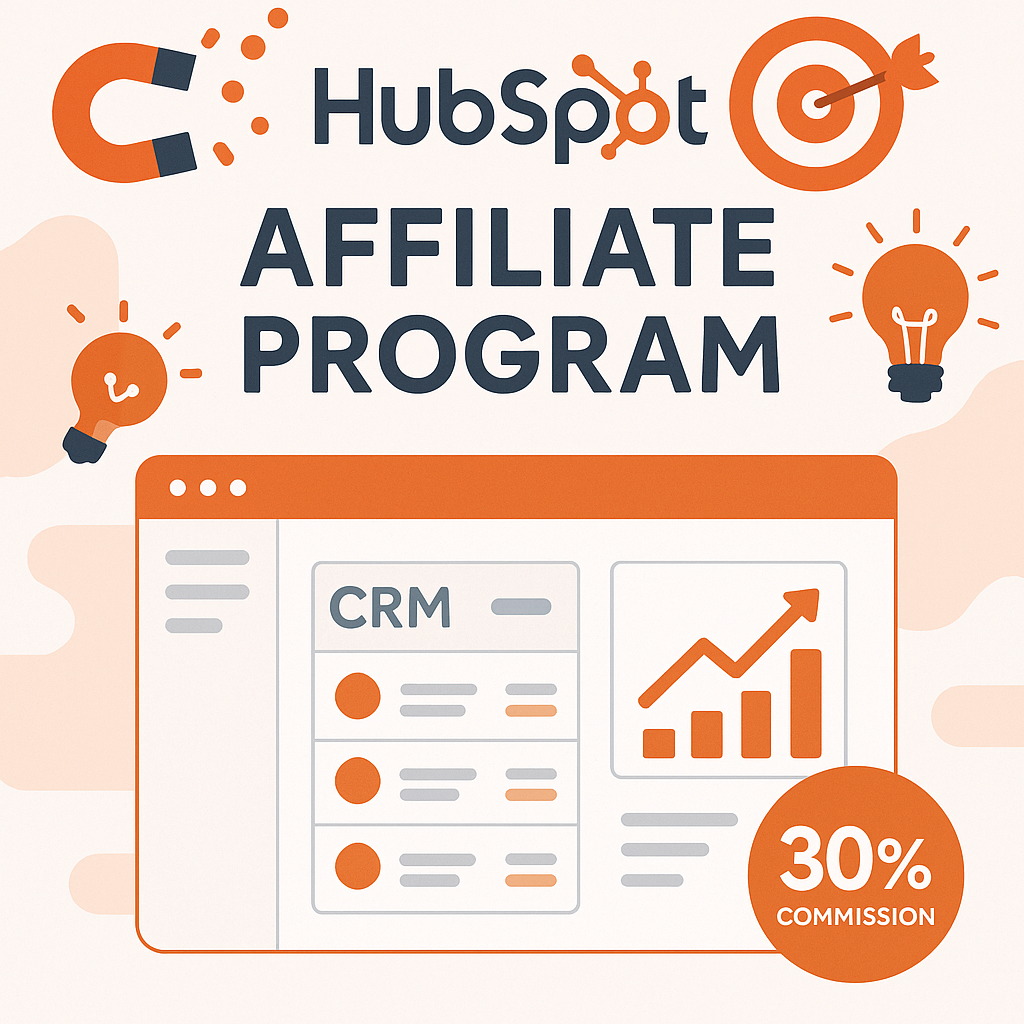
HubSpot stands as one of the most comprehensive B2B SaaS affiliate marketing opportunities available in 2025. With over 100,000 customers worldwide and a reputation for innovation in marketing, sales, and customer service software, HubSpot offers affiliates a program that combines generous commissions with strong brand recognition.
Commission Structure: 30% recurring commissions for up to 12 months Cookie Duration: 180 days Average Customer Value: $1,200 annually Payment Terms: Monthly payments via PayPal or bank transfer Minimum Payout: $100
HubSpot's affiliate program excels in several key areas. The 180-day cookie duration is among the longest in the industry, recognizing that B2B software decisions often involve extended evaluation periods. The company provides extensive marketing resources, including landing pages, email templates, and detailed product training materials.
The platform's freemium model makes it easier for affiliates to promote, as prospects can start using HubSpot's tools immediately without any upfront cost. This low barrier to entry often leads to higher conversion rates, as potential customers can experience the value before committing to paid plans.
What sets HubSpot apart is its comprehensive ecosystem approach. Rather than promoting a single tool, affiliates can position HubSpot as a complete growth platform that addresses marketing, sales, and customer service needs. This broader value proposition often results in higher-value customers and longer retention periods.
3. Semrush - The SEO and Digital Marketing Powerhouse
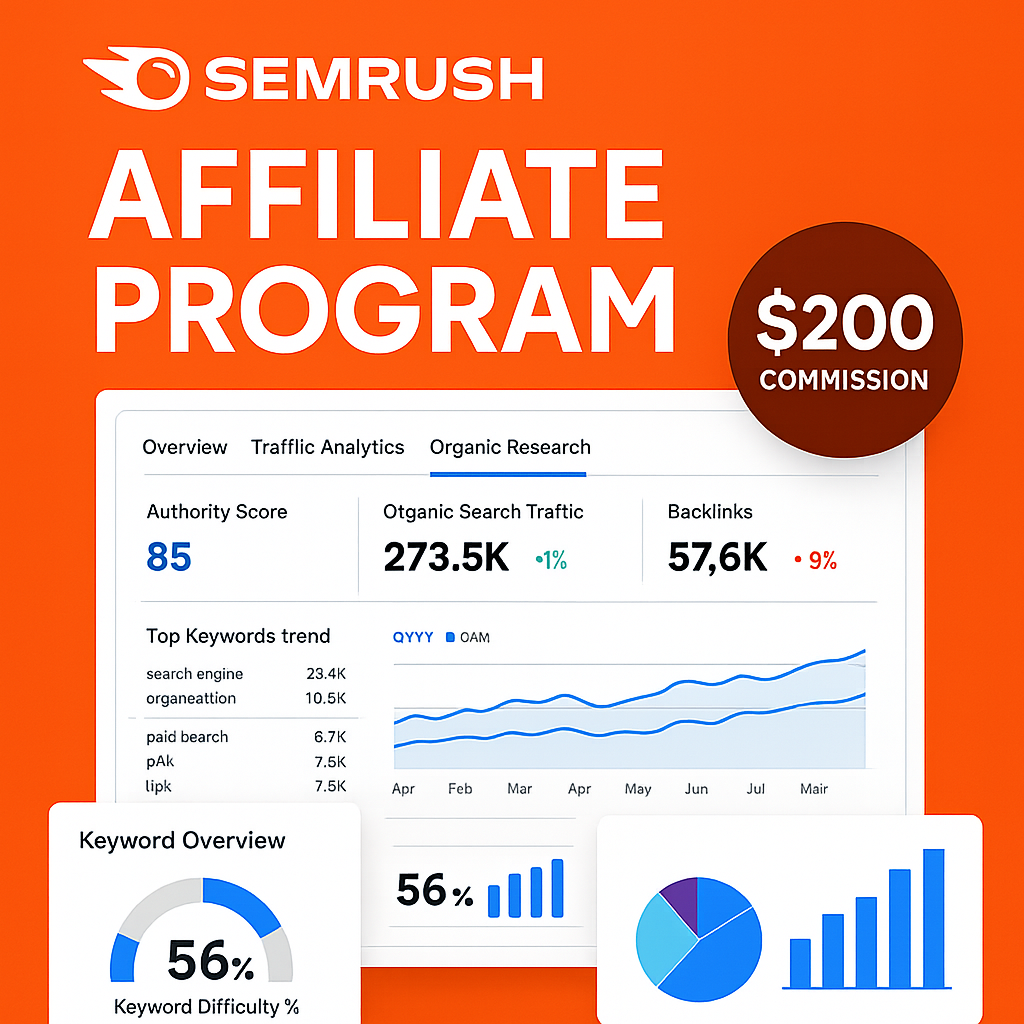
Semrush has established itself as an indispensable tool for digital marketers, SEO professionals, and content creators. With over 7 million users globally, the platform offers one of the most lucrative high-paying affiliate programs in the digital marketing space.
Commission Structure: $200 per sale + $10 per trial signup Cookie Duration: 120 days Average Customer Value: $1,800 annually Payment Terms: Monthly payments via PayPal Minimum Payout: $100
The Semrush affiliate program is particularly attractive because it combines immediate payouts with trial incentives. The $10 per trial signup means affiliates can earn revenue even from prospects who don't immediately convert to paid plans. Given Semrush's strong trial-to-paid conversion rate of approximately 15%, many trial signups eventually become full sales.
Semrush provides affiliates with comprehensive promotional materials, including banner ads, landing pages, and detailed competitive analysis reports that can be used as lead magnets. The company also offers regular webinars and training sessions to help affiliates better understand and promote the platform's extensive feature set.
The platform's broad appeal across multiple user segments—from small business owners to enterprise marketing teams—provides affiliates with flexibility in targeting different audiences. Whether promoting to bloggers looking to improve their SEO or agencies needing comprehensive client reporting tools, Semrush offers solutions for various market segments.
4. ClickFunnels - The Sales Funnel Builder
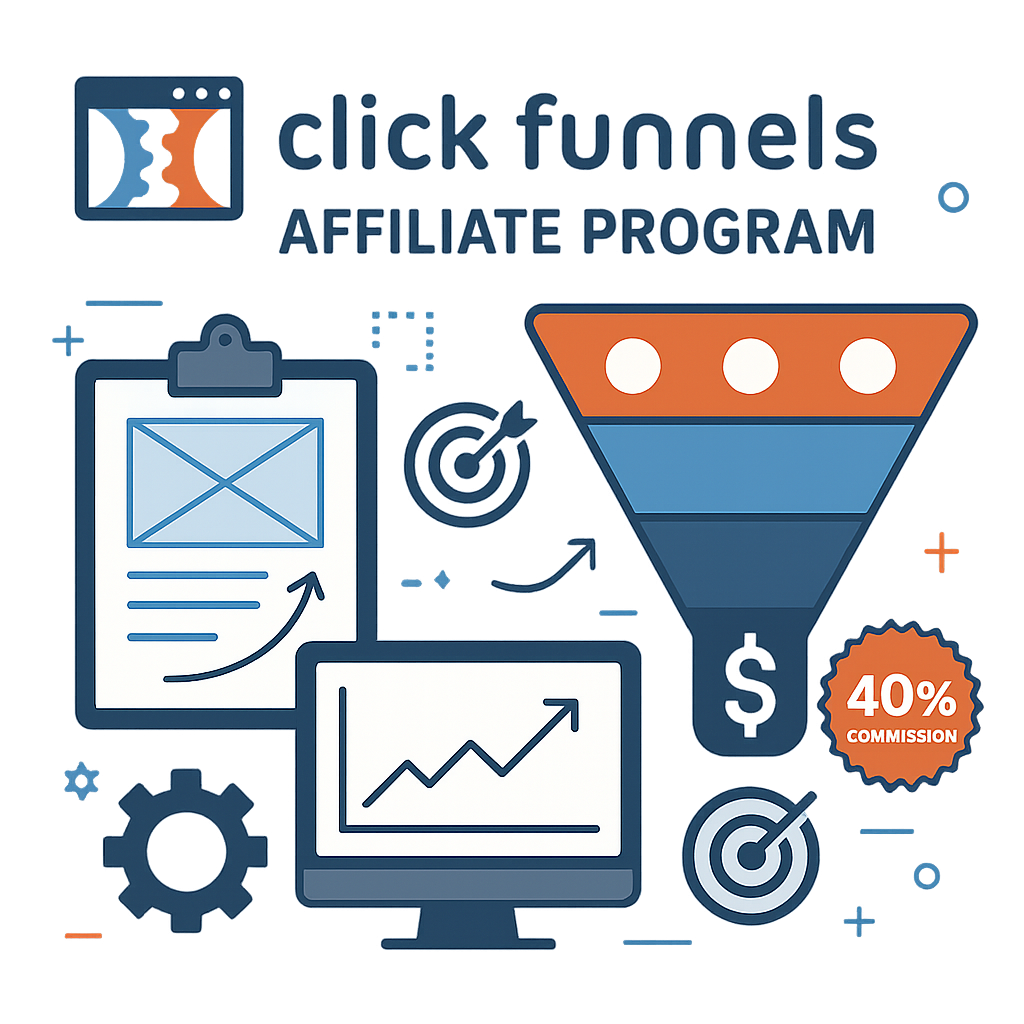
ClickFunnels has revolutionized how businesses approach online sales and marketing funnels. With a passionate user base and strong community support, ClickFunnels offers one of the most engaging subscription-based affiliate programs in the marketing technology space.
Commission Structure: 20-40% recurring commissions (tier-based) Cookie Duration: 30 days Average Customer Value: $1,200 annually Payment Terms: Bi-weekly payments via PayPal or check Minimum Payout: $100
ClickFunnels employs a tiered commission structure that rewards high-performing affiliates. New affiliates start at 20% recurring commissions, but can advance to 30% after generating $1,000 in commissions and 40% after reaching $5,000. This progression system incentivizes affiliates to focus their efforts on ClickFunnels rather than spreading attention across multiple programs.
The program's strength lies in its community-driven approach. ClickFunnels regularly features successful affiliates in case studies and provides platforms for top performers to share their strategies. The annual Funnel Hacking Live event serves as both a user conference and affiliate networking opportunity.
ClickFunnels also offers unique promotional opportunities, including the ability to promote Russell Brunson's books and courses, which serve as effective lead magnets for the main software platform. This ecosystem approach provides multiple entry points for potential customers and additional earning opportunities for affiliates.
5. ActiveCampaign - The Customer Experience Automation Platform
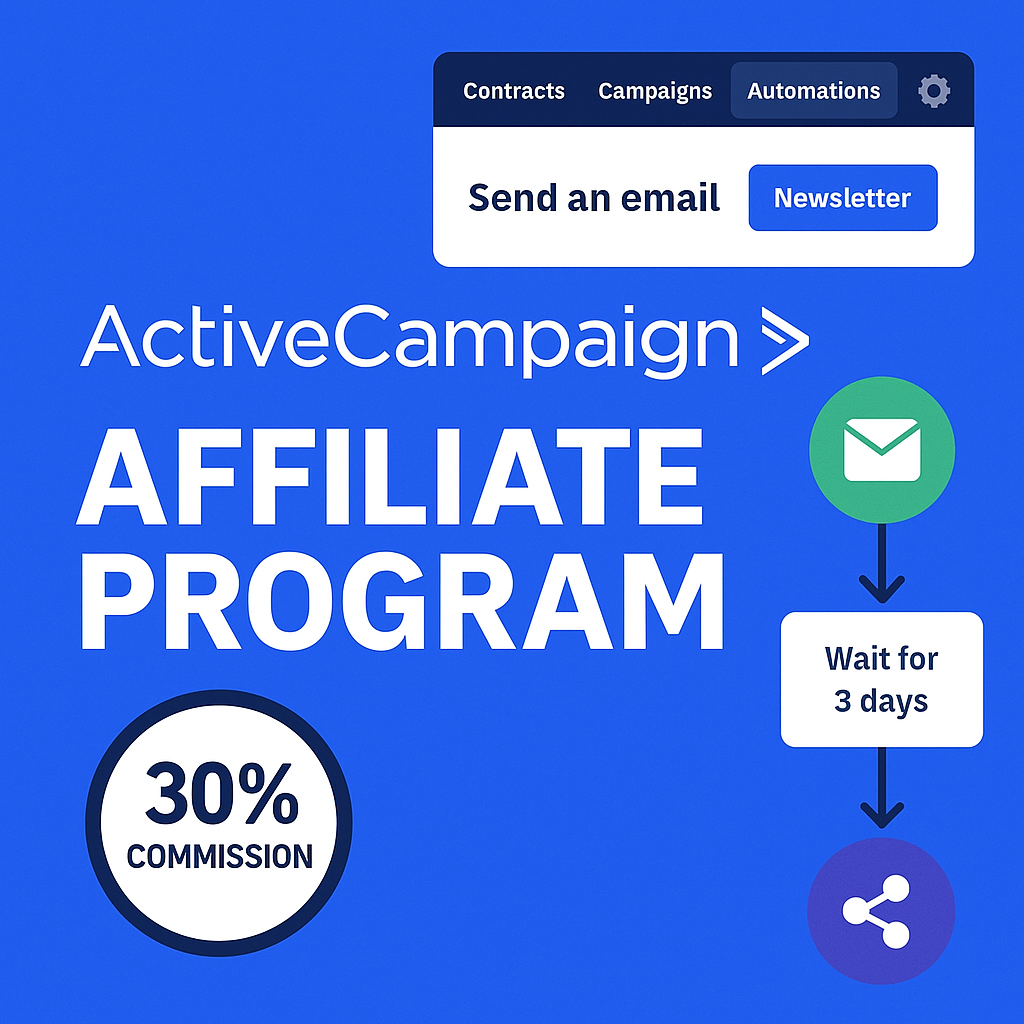
ActiveCampaign has emerged as a leader in email marketing automation and customer experience platforms. With over 150,000 customers across 170 countries, the platform offers affiliates access to a rapidly growing market with strong retention rates.
Commission Structure: 20-30% recurring commissions Cookie Duration: 90 days Average Customer Value: $900 annually Payment Terms: Monthly payments via PayPal or bank transfer Minimum Payout: $50
ActiveCampaign's affiliate program stands out for its focus on customer success and retention. The platform maintains one of the highest customer satisfaction scores in the email marketing space, which translates to lower churn rates and longer commission periods for affiliates.
The program offers extensive educational resources, including certification courses that affiliates can complete to better understand the platform's capabilities. These certifications not only improve promotional effectiveness but also provide credibility when positioning oneself as an ActiveCampaign expert.
ActiveCampaign's strength in automation and personalization makes it particularly appealing to businesses looking to scale their marketing efforts. This positioning allows affiliates to target growing businesses that are ready to invest in more sophisticated marketing tools, often resulting in higher-value customers.
6. Shopify - The E-commerce Platform Leader
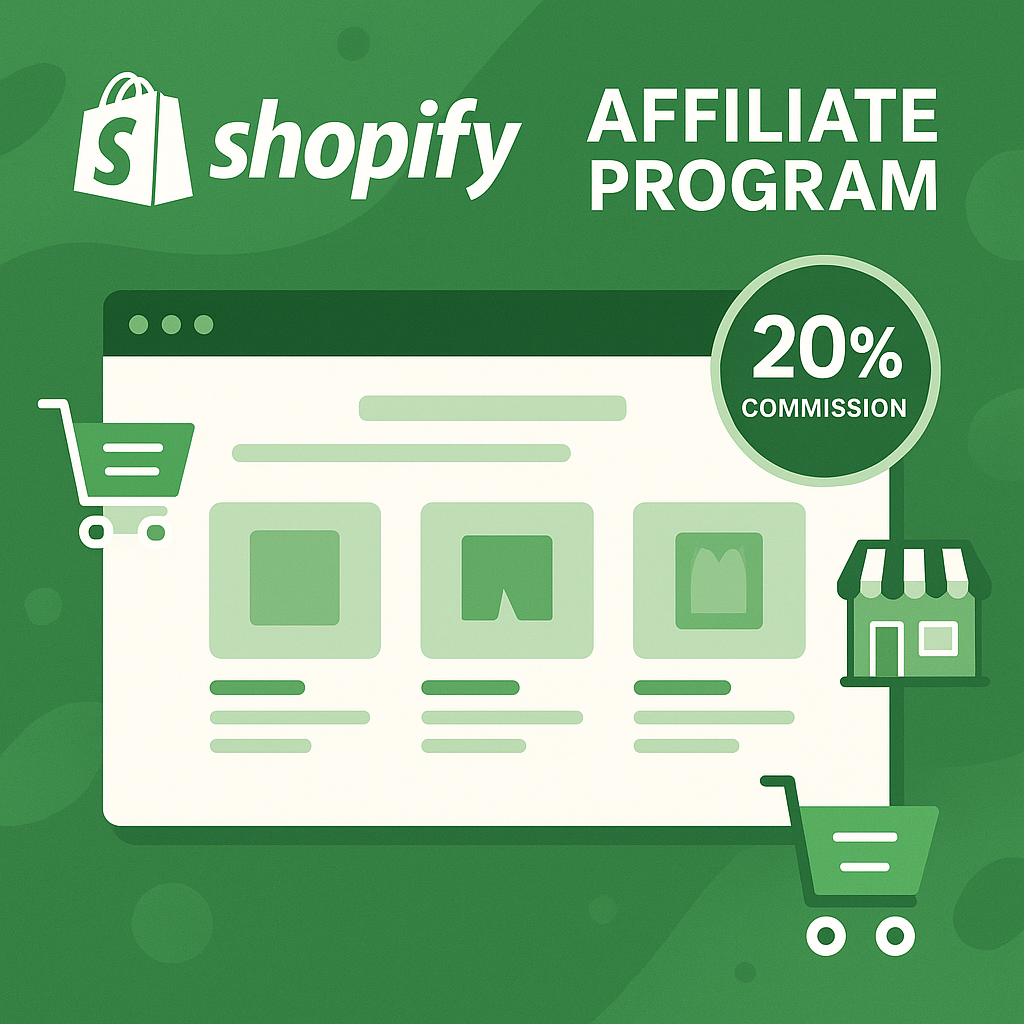
Shopify's dominance in the e-commerce platform space makes it one of the most reliable cloud-based software affiliate programs available. With over 1.7 million businesses using the platform globally, Shopify offers affiliates access to a massive and growing market.
Commission Structure: 20% recurring commissions or up to $2,000 per sale (for Shopify Plus) Cookie Duration: 30 days Average Customer Value: $1,500 annually Payment Terms: Monthly payments via PayPal Minimum Payout: $25
Shopify's affiliate program benefits from the platform's strong brand recognition and comprehensive ecosystem. Beyond the core e-commerce platform, affiliates can promote Shopify's various tools and services, including Shopify Payments, Shopify Shipping, and the extensive app marketplace.
The program's dual commission structure allows affiliates to choose between recurring commissions for standard Shopify plans or higher one-time payouts for enterprise-level Shopify Plus customers. This flexibility enables affiliates to optimize their approach based on their audience and promotional strategies.
Shopify provides extensive marketing resources, including product demos, case studies, and industry reports that affiliates can use to educate prospects about e-commerce best practices. The company's regular release of new features and integrations also provides ongoing content opportunities for affiliate marketers.
7. Freshbooks - The Small Business Accounting Solution
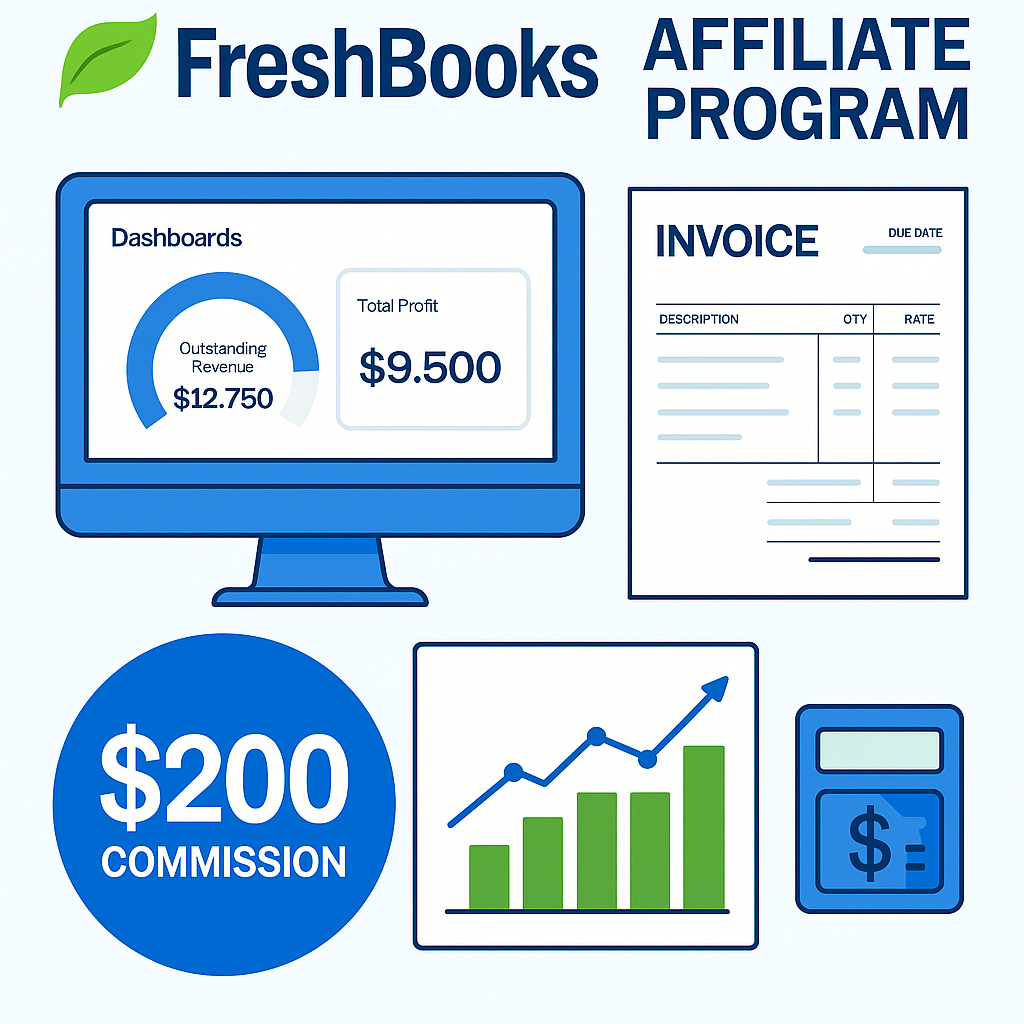
Freshbooks has carved out a strong position in the small business accounting software market, offering affiliates access to a underserved but lucrative segment. With over 24 million users worldwide, Freshbooks provides a stable foundation for affiliate marketing passive income.
Commission Structure: $200 per sale + $10 per trial + recurring elements Cookie Duration: 120 days Average Customer Value: $600 annually Payment Terms: Monthly payments via PayPal or check Minimum Payout: $100
Freshbooks' hybrid commission structure provides both immediate income and long-term earning potential. The $200 per sale commission offers substantial upfront revenue, while the trial incentives help affiliates monetize prospects who may not immediately convert to paid plans.
The platform's focus on small businesses and freelancers creates opportunities for affiliates to target specific niches, such as creative professionals, consultants, and service-based businesses. This targeted approach often results in higher conversion rates compared to promoting more general business software.
Freshbooks provides comprehensive onboarding support for new affiliates, including personalized strategy sessions and access to successful case studies. The company's commitment to affiliate success is reflected in its dedicated affiliate support team and regular program updates.
8. Notion - The All-in-One Workspace
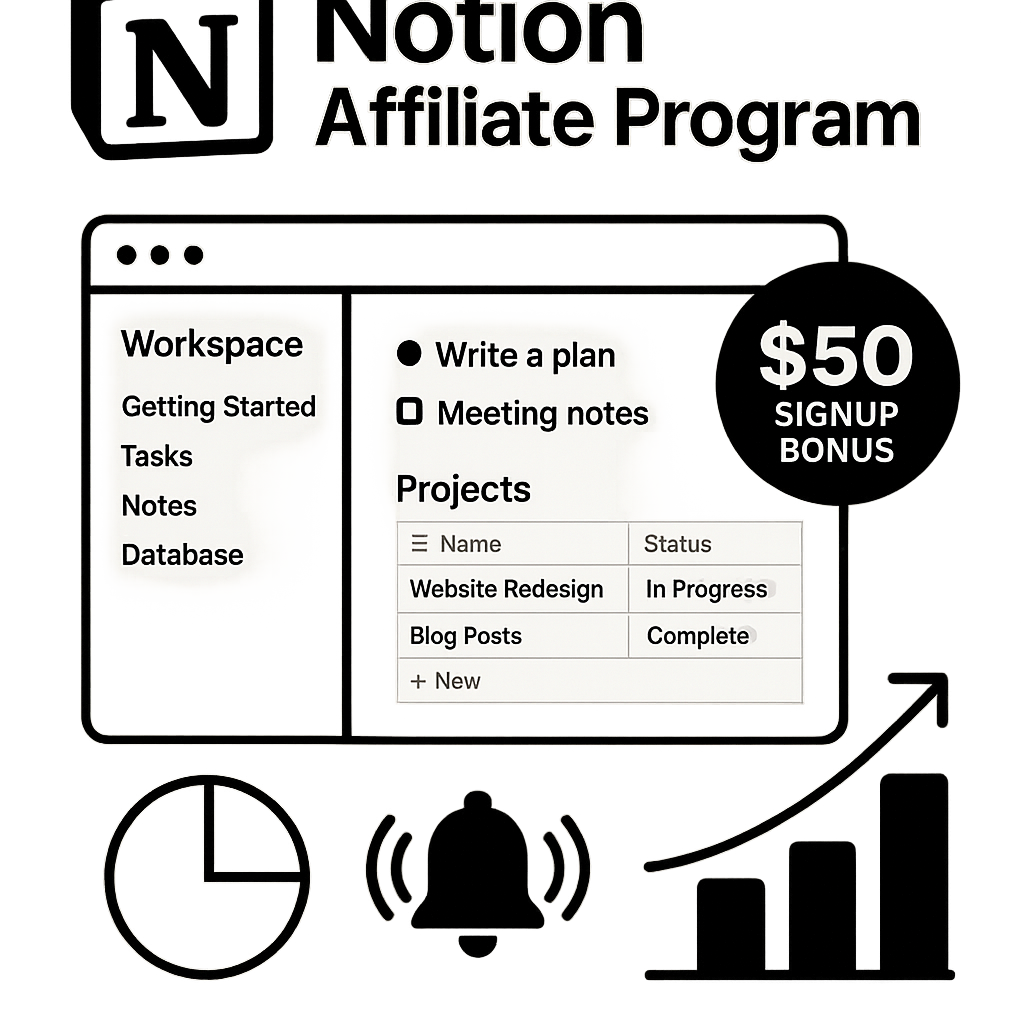
Notion has rapidly gained popularity as a versatile workspace platform that combines note-taking, project management, and database functionality. The platform's viral growth and passionate user community make it an attractive option for affiliates targeting productivity-focused audiences.
Commission Structure: Up to $50 per signup + 20% of year one revenue Cookie Duration: 180 days Average Customer Value: $800 annually Payment Terms: Monthly payments via Stripe Minimum Payout: $20
Notion's unique commission structure combines signup bonuses with revenue sharing, providing multiple earning opportunities. The platform's freemium model and viral sharing features often lead to organic growth beyond initial referrals, as users frequently invite team members and colleagues to their workspaces.
The extended 180-day cookie duration reflects Notion's understanding that workspace adoption often involves team evaluation and gradual rollout processes. This extended attribution window significantly increases the likelihood of earning commissions from prospects who may take time to fully commit to the platform.
Notion's flexibility and customization options make it appealing to a wide range of users, from individual productivity enthusiasts to large enterprise teams. This broad appeal provides affiliates with multiple targeting opportunities and promotional angles.
9. Grammarly - The Writing Enhancement Platform
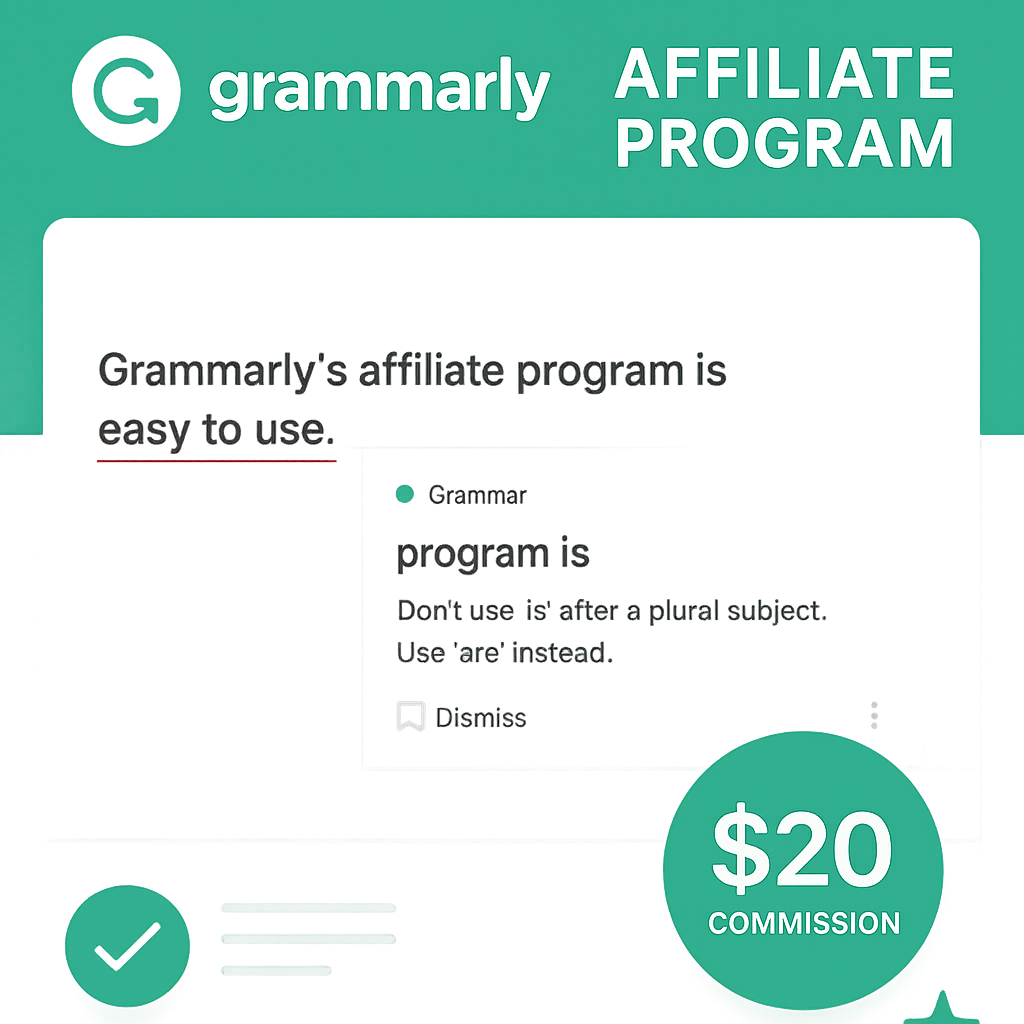
Grammarly's position as the leading writing assistance platform makes it one of the most accessible digital marketing affiliate programs for content creators and educators. With over 30 million daily active users, Grammarly offers affiliates access to a massive and engaged user base.
Commission Structure: $0.20 per free signup + $20 per premium upgrade Cookie Duration: 90 days Average Customer Value: $144 annually Payment Terms: Monthly payments via PayPal Minimum Payout: $50
Grammarly's two-tier commission structure allows affiliates to earn from both free signups and premium conversions. While the per-signup commission is modest, the volume potential is significant given Grammarly's broad appeal across virtually every demographic that writes digitally.
The platform's freemium model makes it easy for affiliates to promote, as there's no barrier to entry for prospects. The free version provides immediate value while demonstrating the platform's capabilities, often leading to natural upgrades to premium features.
Grammarly's universal appeal—from students and professionals to non-native English speakers—provides affiliates with numerous targeting opportunities. The platform's integration with popular writing tools and browsers also creates multiple promotional touchpoints.
10. Canva Pro - The Design Platform for Everyone
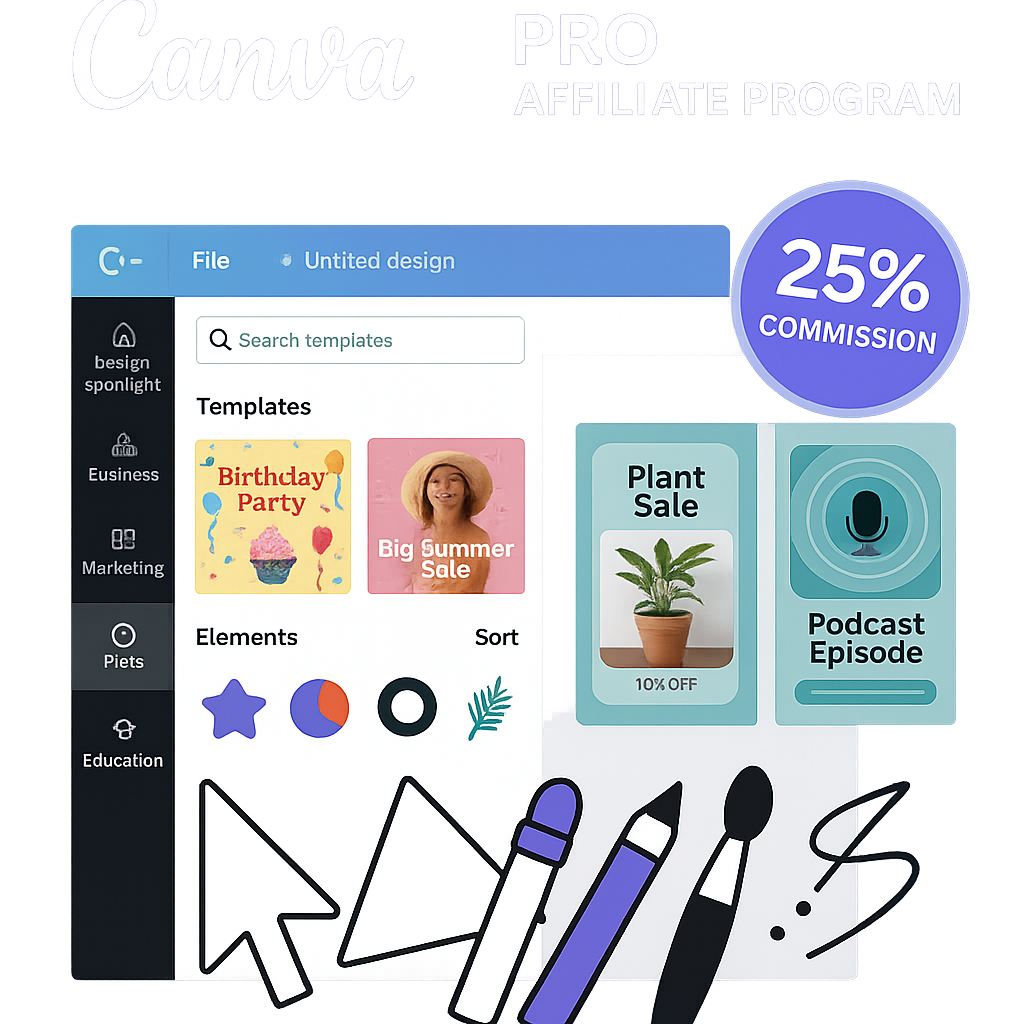
Canva has democratized graphic design, making professional-quality design accessible to users without formal design training. The platform's massive user base and high engagement rates make Canva Pro an attractive affiliate opportunity for creators and marketers.
Commission Structure: 25% recurring commissions for 12 months Cookie Duration: 30 days Average Customer Value: $120 annually Payment Terms: Monthly payments via PayPal Minimum Payout: $20
Canva Pro's affiliate program benefits from the platform's strong organic growth and user engagement. The free version of Canva serves as an effective lead magnet, allowing users to experience the platform's value before upgrading to Pro features.
The platform's broad appeal across industries and user types—from social media managers and small business owners to educators and students—provides affiliates with numerous targeting opportunities. Canva's regular addition of new features and templates also creates ongoing promotional content opportunities.
Canva provides affiliates with access to design templates and promotional materials created within the platform itself, ensuring that marketing materials maintain the high visual standards associated with the brand.
11. Mailchimp - The Marketing Automation Platform
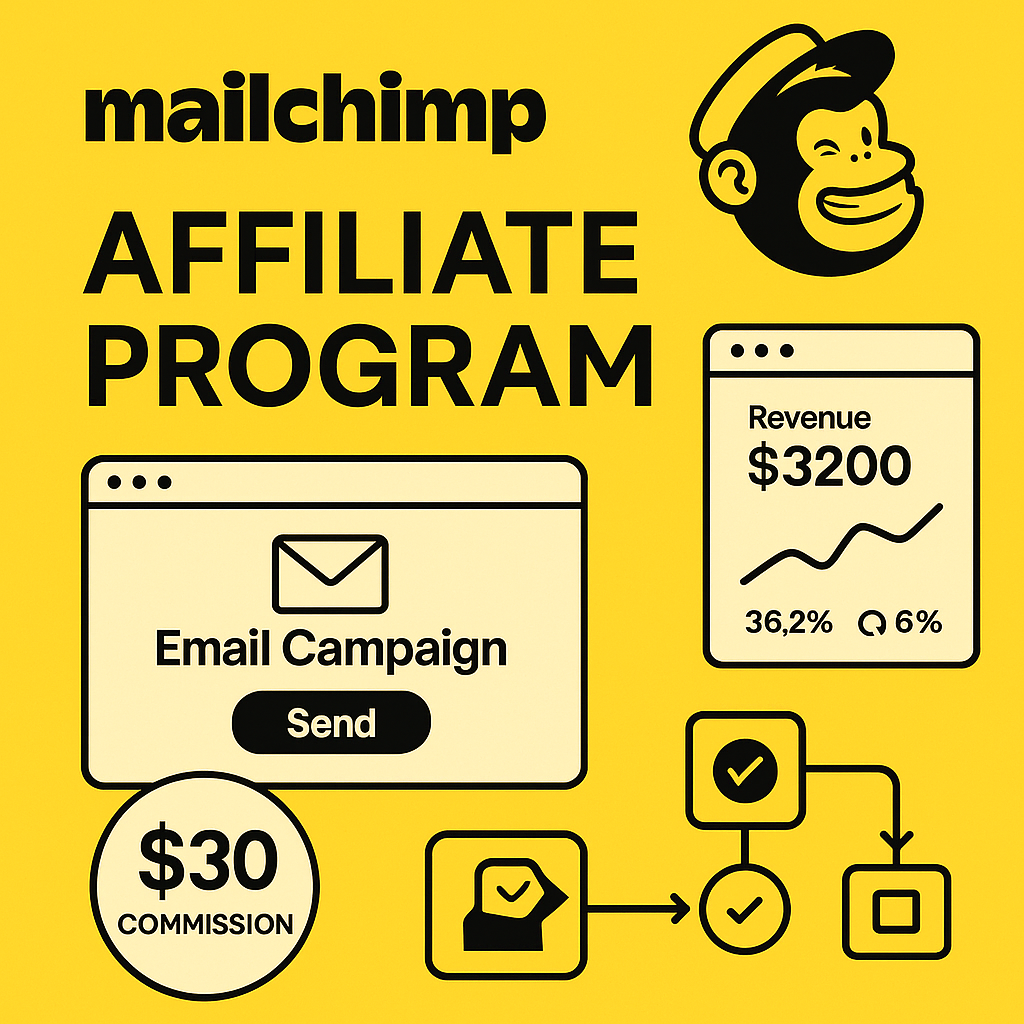
Mailchimp's evolution from an email marketing tool to a comprehensive marketing automation platform has created new opportunities for affiliates. With over 12 million customers worldwide, Mailchimp offers access to a mature and stable market.
Commission Structure: $30 per signup + recurring elements Cookie Duration: 30 days Average Customer Value: $600 annually Payment Terms: Monthly payments via PayPal Minimum Payout: $50
Mailchimp's freemium model and strong brand recognition make it relatively easy for affiliates to promote. The platform's reputation for reliability and ease of use appeals to small businesses and entrepreneurs who may be intimidated by more complex marketing tools.
The program's strength lies in Mailchimp's comprehensive feature set, which has expanded beyond email marketing to include landing pages, social media advertising, and e-commerce integrations. This broader platform approach allows affiliates to position Mailchimp as a complete marketing solution rather than just an email tool.
Mailchimp provides extensive educational resources and marketing materials, including templates, guides, and case studies that affiliates can use to demonstrate the platform's value to prospects.
12. Zoom - The Video Communications Platform
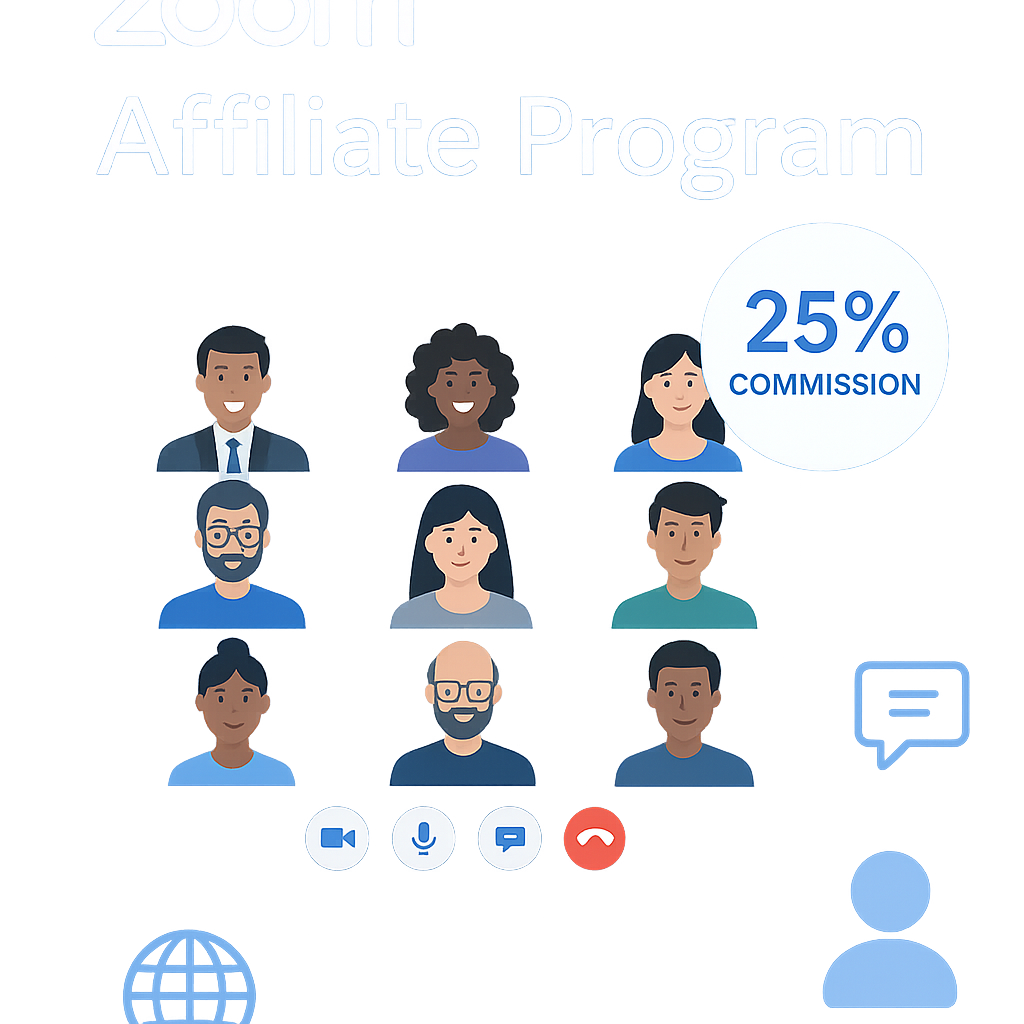
Zoom's dominance in video communications, accelerated by remote work trends, has created substantial opportunities for affiliates. The platform's essential role in modern business operations makes it a stable and growing affiliate opportunity.
Commission Structure: 25% recurring commissions for 12 months Cookie Duration: 30 days Average Customer Value: $1,200 annually Payment Terms: Monthly payments via PayPal or bank transfer Minimum Payout: $100
Zoom's affiliate program benefits from the platform's position as essential business infrastructure. The shift to remote and hybrid work models has made video communications a permanent fixture in business operations, creating sustained demand for Zoom's services.
The platform's scalability—from individual professionals to large enterprises—provides affiliates with opportunities to target various market segments. Zoom's continuous innovation in areas like webinars, phone systems, and collaboration tools also creates ongoing promotional opportunities.
Zoom provides comprehensive training and certification programs for affiliates, helping them better understand and promote the platform's extensive feature set and integration capabilities.
13. Teachable - The Online Course Platform
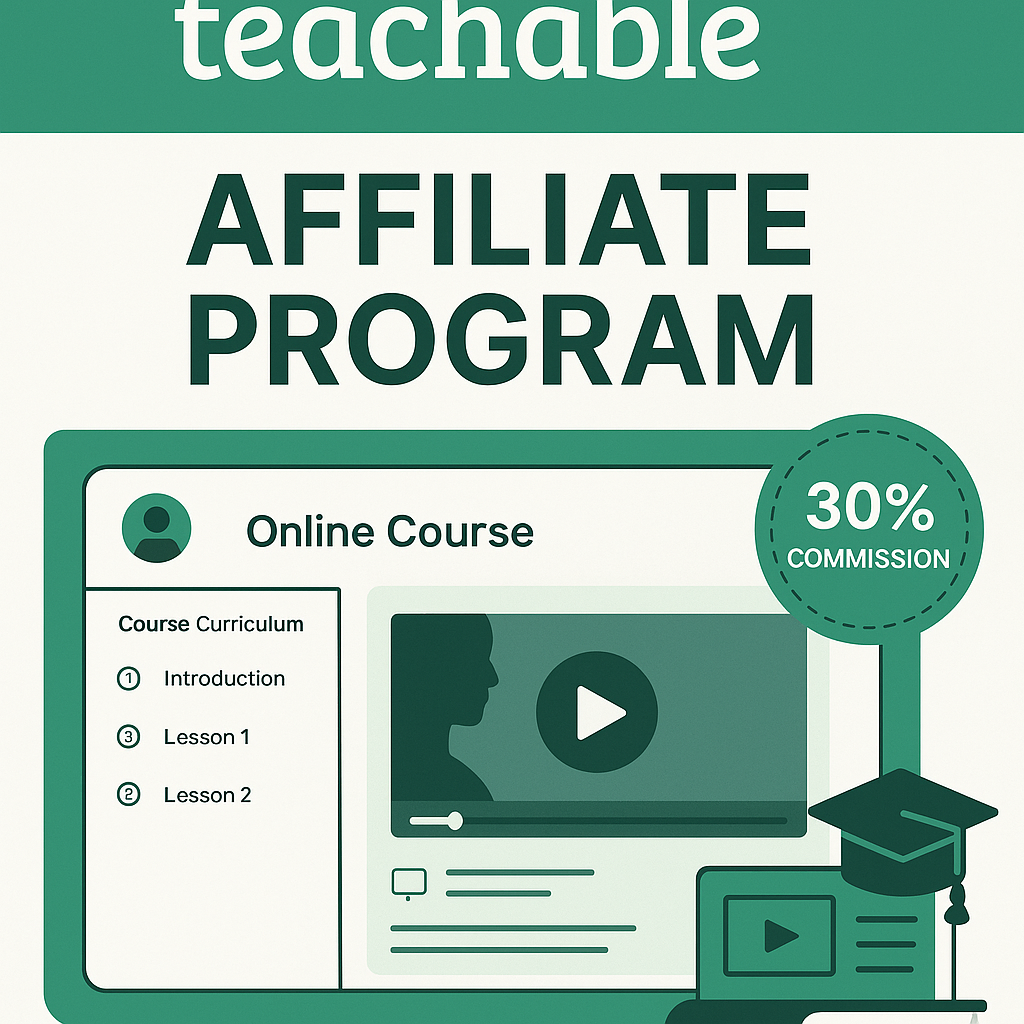
Teachable has established itself as a leading platform for creating and selling online courses. The growth of the online education market makes Teachable an attractive affiliate opportunity for educators and content creators.
Commission Structure: 30% recurring commissions for 12 months Cookie Duration: 90 days Average Customer Value: $900 annually Payment Terms: Monthly payments via PayPal Minimum Payout: $100
Teachable's affiliate program appeals particularly to affiliates who are themselves course creators or educators. The platform's focus on empowering individual entrepreneurs and small businesses creates opportunities for authentic, experience-based promotion.
The program benefits from the growing online education market, which has seen sustained growth beyond the initial pandemic-driven surge. Teachable's comprehensive feature set, including marketing tools, student management, and payment processing, positions it as a complete solution for course creators.
Teachable provides extensive resources for affiliates, including course creation guides, marketing templates, and success stories that can be used to demonstrate the platform's potential to prospects.
14. ConvertKit - The Creator Economy Email Platform
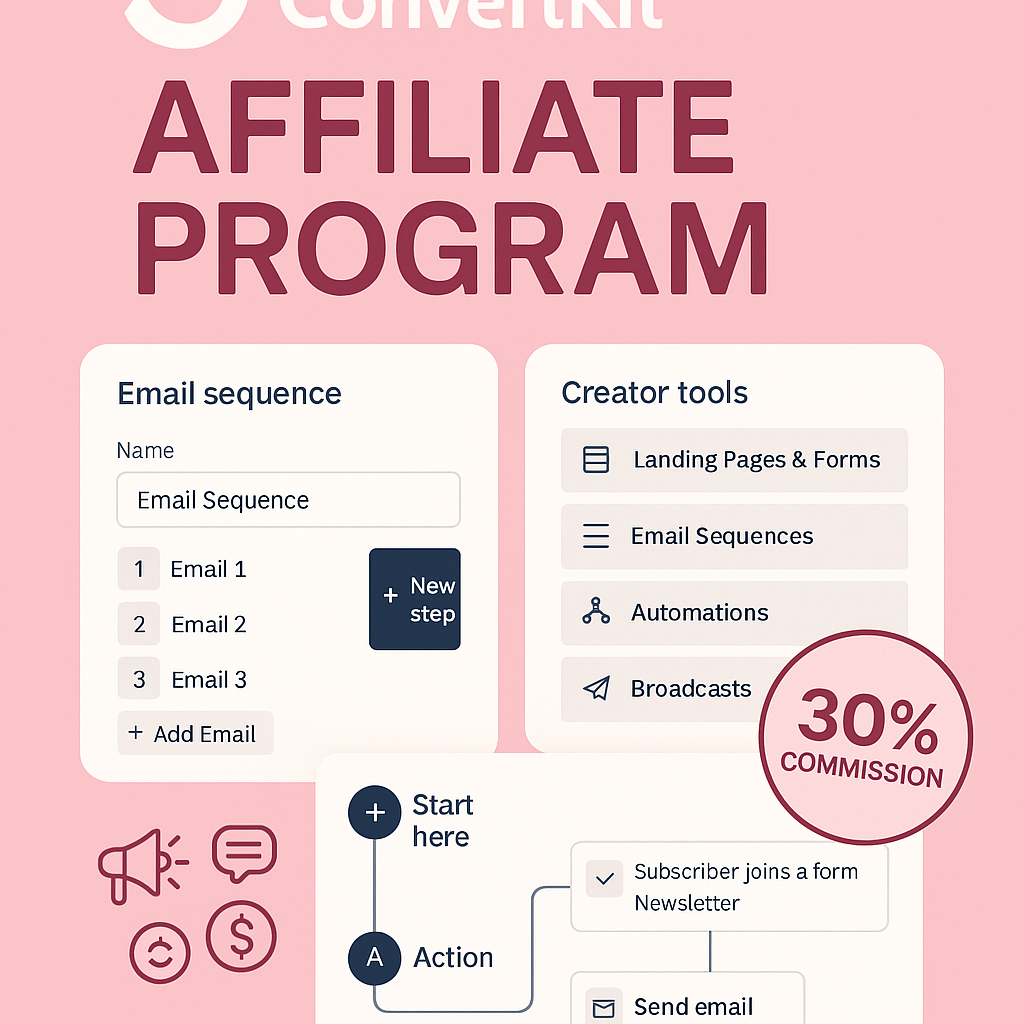
ConvertKit has positioned itself as the email marketing platform specifically designed for creators, bloggers, and online entrepreneurs. This focused positioning creates opportunities for affiliates to target specific niches with tailored messaging.
Commission Structure: 30% recurring commissions for 24 months Cookie Duration: 60 days Average Customer Value: $600 annually Payment Terms: Monthly payments via PayPal Minimum Payout: $100
ConvertKit's extended 24-month commission period is among the longest in the industry, providing substantial long-term earning potential. The platform's focus on creators and the creator economy aligns well with current market trends and provides clear targeting opportunities for affiliates.
The program's strength lies in ConvertKit's reputation within the creator community and its specialized features for content creators, such as subscriber tagging, automation sequences, and integration with creator tools.
ConvertKit provides comprehensive educational resources about email marketing for creators, which affiliates can use to provide value to their audiences while naturally introducing the platform as a solution.
15. Pipedrive - The Sales CRM Platform
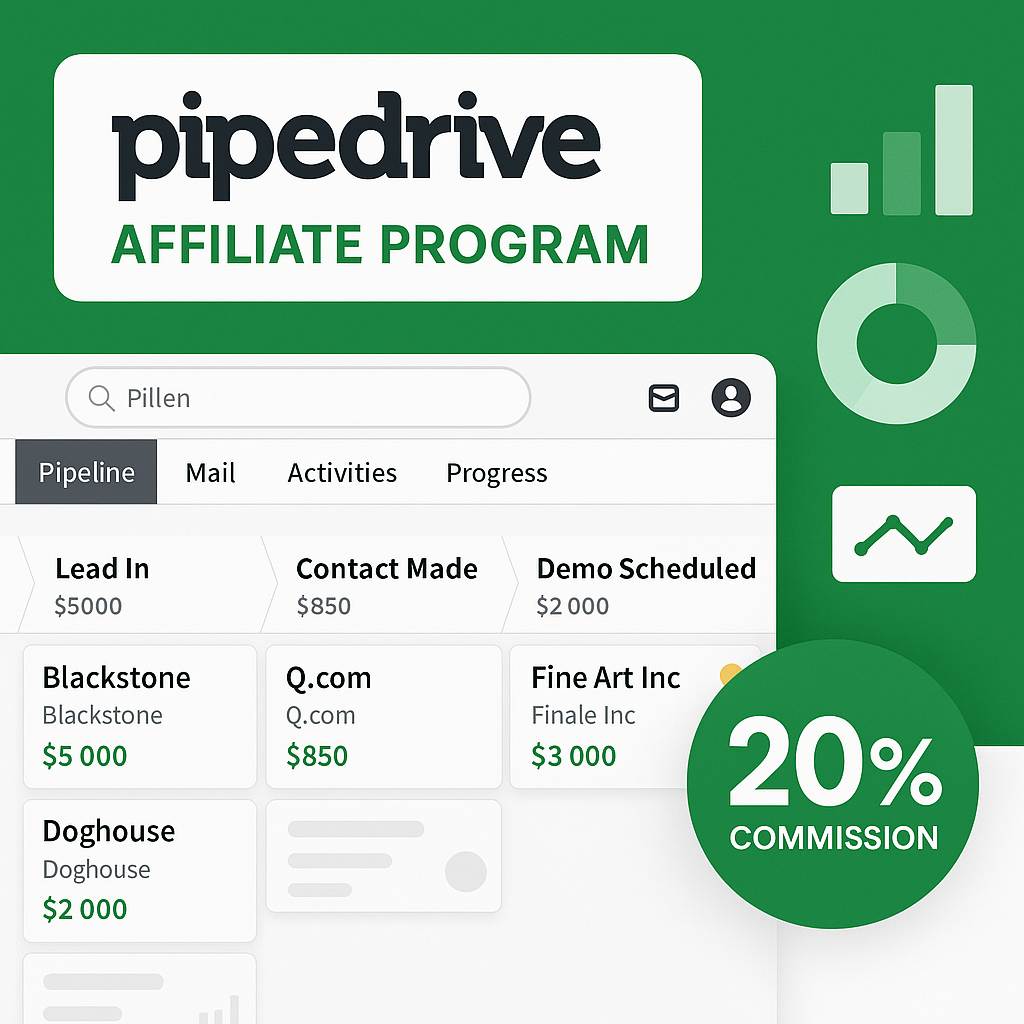
Pipedrive has built a strong reputation as a user-friendly CRM platform designed specifically for sales teams. The platform's focus on sales process optimization makes it attractive to a wide range of businesses looking to improve their sales performance.
Commission Structure: 20% recurring commissions Cookie Duration: 90 days Average Customer Value: $1,200 annually Payment Terms: Monthly payments via PayPal or bank transfer Minimum Payout: $100
Pipedrive's affiliate program benefits from the platform's strong reputation among sales professionals and its focus on usability and results. The CRM market's continued growth, driven by businesses' need to better manage customer relationships, provides a stable foundation for affiliate earnings.
The platform's visual pipeline approach and mobile-first design make it appealing to modern sales teams, particularly those in small to medium-sized businesses. This positioning allows affiliates to target growing companies that are ready to invest in sales process improvement.
Pipedrive provides comprehensive sales training and CRM best practices resources that affiliates can use to educate prospects while demonstrating the platform's value.
16. Monday.com - The Work Operating System
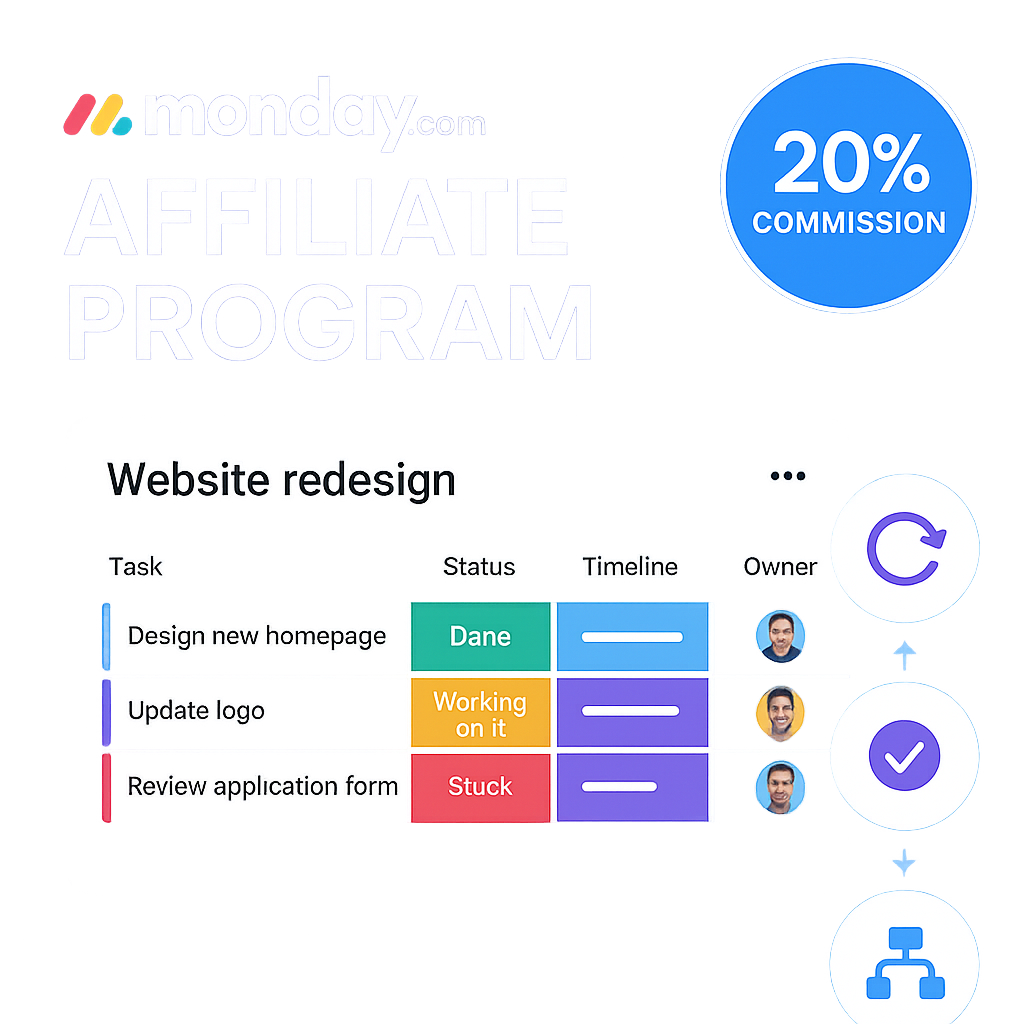
Monday.com has positioned itself as a comprehensive work operating system that goes beyond traditional project management to encompass team collaboration, workflow automation, and business process management.
Commission Structure: 20% recurring commissions Cookie Duration: 90 days Average Customer Value: $1,800 annually Payment Terms: Monthly payments via PayPal Minimum Payout: $100
Monday.com's affiliate program benefits from the platform's broad appeal across industries and team sizes. The platform's flexibility and customization options make it suitable for various use cases, from simple project tracking to complex workflow automation.
The program's strength lies in Monday.com's strong visual design and user experience, which makes it easy for affiliates to demonstrate the platform's value through screenshots and demos. The platform's regular addition of new features and integrations also provides ongoing content opportunities.
Monday.com provides extensive training resources and certification programs for affiliates, helping them better understand and communicate the platform's capabilities to different market segments.
Key Metrics That Matter in SaaS Affiliate Marketing
Success in SaaS affiliate programs requires understanding and tracking specific metrics that differ from traditional affiliate marketing. These metrics provide insights into both immediate performance and long-term earning potential, enabling affiliates to optimize their strategies and maximize their affiliate marketing passive income.
Conversion Rate by Traffic Source becomes particularly important in SaaS affiliate marketing because different traffic sources often have varying levels of intent and familiarity with software solutions. Organic search traffic typically converts at higher rates for SaaS products because users are actively seeking solutions to specific problems. Social media traffic may have lower immediate conversion rates but can be valuable for building awareness and nurturing prospects through longer sales cycles
Customer Lifetime Value (CLV) Impact measures how the customers you refer perform compared to other acquisition channels. High-quality affiliates often refer customers with above-average retention rates and upgrade propensity. Tracking this metric can help you negotiate better commission rates and demonstrate your value to SaaS companies beyond just initial conversions.
Time to Conversion varies significantly in B2B SaaS affiliate marketing compared to consumer products. While an e-commerce purchase might happen within hours or days of the initial click, SaaS conversions often take weeks or months. Understanding these patterns helps in planning content strategies and setting realistic expectations for campaign performance.
Trial-to-Paid Conversion Rates are crucial for programs that offer trial incentives. Some affiliates excel at driving trial signups but struggle with trial-to-paid conversions, while others may have lower trial volumes but higher conversion rates. Optimizing for quality over quantity often leads to better long-term results in SaaS affiliate marketing.
Churn Rate of Referred Customers directly impacts your recurring commission earnings. If customers you refer have higher-than-average churn rates, your long-term earnings will suffer even if your initial conversion rates are strong. This metric emphasizes the importance of referring qualified prospects who are genuinely good fits for the software.
Average Revenue Per User (ARPU) Growth tracks whether the customers you refer tend to upgrade their plans over time. Customers who start with basic plans but gradually upgrade to premium features generate increasing commission amounts, making them more valuable than customers who remain on entry-level plans.
Attribution Window Performance analyzes how your conversions are distributed across the cookie duration period. If most of your conversions happen within the first few days after a click, you might benefit from programs with shorter cookie durations but higher commission rates. Conversely, if your conversions are spread throughout longer attribution windows, programs with extended cookie durations become more valuable.
Strategies for Success in SaaS Affiliate Marketing
Succeeding in SaaS affiliate programs requires a strategic approach that differs significantly from traditional affiliate marketing. The longer sales cycles, higher price points, and recurring nature of SaaS products demand more sophisticated marketing strategies and deeper audience understanding.
Content-First Approach forms the foundation of successful SaaS affiliate marketing. Unlike impulse purchases that can be driven by simple promotional content, SaaS products require educational content that helps prospects understand their problems and evaluate solutions. Creating comprehensive guides, comparison articles, and case studies establishes authority and trust while naturally incorporating affiliate links.
Successful SaaS affiliates often become subject matter experts in specific niches or software categories. Rather than promoting dozens of different tools, focusing on 3-5 complementary SaaS products allows for deeper expertise development and more authentic recommendations. This specialization also enables the creation of comprehensive content ecosystems around related topics.
Email List Building becomes particularly valuable in SaaS affiliate marketing due to the extended sales cycles. Building an email list of prospects interested in specific software categories allows for nurturing relationships over time and promoting relevant tools as needs evolve. Email sequences can educate prospects about software selection criteria while positioning specific tools as solutions.
Free Resource Creation serves as an effective lead magnet and trust-building strategy. Creating templates, checklists, or mini-courses related to the problems that SaaS tools solve provides immediate value while demonstrating expertise. These resources can naturally incorporate mentions of relevant tools and include affiliate links for prospects ready to implement solutions.
Community Building around specific software categories or business challenges creates ongoing opportunities for authentic promotion. Whether through Facebook groups, Discord servers, or LinkedIn communities, building engaged audiences interested in specific topics provides platforms for sharing experiences and recommendations.
Partnership Development with SaaS companies goes beyond basic affiliate relationships. Top-performing affiliates often develop closer partnerships that include co-marketing opportunities, exclusive promotional materials, and input on product development. These relationships can lead to higher commission rates and preferential treatment.
Multi-Channel Promotion strategies recognize that SaaS buyers often research across multiple channels before making decisions. Successful affiliates maintain consistent messaging across blog content, social media, email marketing, and video content while adapting the format and depth to each channel's strengths.
Seasonal and Event-Based Promotion takes advantage of natural buying cycles and industry events. Many businesses make software decisions at the beginning of fiscal years, during budget planning periods, or in response to industry conferences and announcements. Timing promotional campaigns around these events can significantly improve conversion rates.
Common Challenges and How to Overcome Them
SaaS affiliate programs present unique challenges that require specific strategies and mindset adjustments. Understanding these challenges and developing systematic approaches to address them is crucial for long-term success in software affiliate marketing.
Extended Sales Cycles represent one of the most significant challenges in SaaS affiliate marketing. Unlike physical products that might be purchased impulsively, SaaS tools often require evaluation periods, team discussions, and budget approvals. This extended timeline can be frustrating for affiliates accustomed to quicker conversions, but it also creates opportunities for deeper engagement and relationship building.
To address extended sales cycles, successful affiliates develop content strategies that support prospects throughout their evaluation journey. This might include comparison guides for prospects in the research phase, implementation tutorials for those ready to commit, and ongoing tips and best practices for existing users who might upgrade or refer colleagues.
Technical Complexity of many SaaS products can make them challenging to promote effectively. Understanding software features, integration capabilities, and use cases requires significant time investment and ongoing education. However, this complexity also creates barriers to entry that protect affiliates who do invest in developing expertise.
Overcoming technical complexity requires systematic learning approaches. Many successful SaaS affiliates maintain active accounts with the tools they promote, participate in user communities, and regularly engage with product updates and new features. This hands-on experience enables authentic promotion and credible problem-solving advice.
Market Saturation in popular SaaS categories means increased competition for the same keywords and audiences. Categories like email marketing, project management, and CRM tools have numerous established affiliates competing for attention. However, market saturation also indicates healthy demand and provides opportunities for differentiation through specialized positioning.
Addressing market saturation requires finding unique angles and underserved niches within broader categories. Rather than competing directly with established affiliates on generic terms like "best email marketing software," focusing on specific use cases like "email marketing for e-commerce stores" or "email automation for SaaS companies" can provide competitive advantages.
Attribution Challenges arise when customers interact with multiple touchpoints before converting. A prospect might discover a tool through your content, research it independently, and eventually convert through another affiliate's link or directly. While cookie-based attribution helps, it doesn't capture all influence, particularly for longer sales cycles.
Managing attribution challenges requires focusing on metrics beyond just direct conversions. Building brand recognition, establishing thought leadership, and creating valuable resources that prospects remember can lead to direct conversions and word-of-mouth referrals that may not be directly attributable but still generate value.
Churn Impact on Earnings means that even successful referrals can stop generating commissions if customers cancel their subscriptions. High churn rates among referred customers can significantly impact long-term earnings, making customer quality more important than quantity.
Minimizing churn impact requires focusing on referring qualified prospects who are genuinely good fits for the software. This means understanding ideal customer profiles, promoting appropriate solutions for specific use cases, and providing realistic expectations about implementation and results.
Future Trends in SaaS Affiliate Marketing
The SaaS affiliate programs landscape continues evolving rapidly, driven by technological advances, changing business needs, and shifts in how companies approach partnership marketing. Understanding these trends helps affiliates position themselves for future opportunities and adapt their strategies accordingly.
AI-Powered Personalization is transforming how SaaS companies approach affiliate partnerships. Advanced analytics and machine learning algorithms enable more sophisticated matching between affiliates and prospects, personalized commission structures based on performance patterns, and automated optimization of promotional materials. Affiliates who embrace these technologies and provide high-quality data will benefit from improved targeting and higher conversion rates.
Vertical-Specific SaaS Solutions continue proliferating as software companies recognize the value of serving specific industries with tailored solutions. This trend creates opportunities for affiliates to develop expertise in particular verticals and become go-to resources for industry-specific software recommendations. Healthcare, legal, construction, and other specialized industries offer less competitive environments for knowledgeable affiliates.
Integration-First Marketing reflects the growing importance of software ecosystems and interoperability. Modern businesses use dozens of software tools that must work together seamlessly. Affiliates who understand integration capabilities and can recommend complementary tool combinations will provide more value than those promoting individual solutions in isolation.
Performance-Based Partnership Evolution is moving beyond simple commission structures toward more sophisticated partnership models. Some SaaS companies are experimenting with equity partnerships, revenue sharing arrangements, and co-marketing agreements with top-performing affiliates. These deeper partnerships require higher commitment levels but offer greater earning potential.
Privacy and Attribution Changes driven by evolving privacy regulations and browser policies are forcing adaptations in tracking and attribution methods. First-party data collection, server-side tracking, and alternative attribution models are becoming more important. Affiliates who adapt early to these changes will maintain competitive advantages as traditional tracking methods become less reliable.
Community-Driven Marketing continues growing as buyers increasingly trust peer recommendations over traditional advertising. SaaS companies are investing more in community building, user-generated content, and peer-to-peer referral programs. Affiliates who build genuine communities around software categories or business challenges will benefit from these trends.
Subscription Fatigue and Consolidation trends may impact the SaaS market as businesses become more selective about software investments. This could lead to increased competition among SaaS providers but also creates opportunities for affiliates who can help businesses optimize their software stacks and identify the most valuable tools.
Conclusion
The landscape of SaaS affiliate programs in 2025 offers unprecedented opportunities for affiliate marketers willing to adapt their strategies to the unique characteristics of software-as-a-service products. The 15 programs highlighted in this guide represent the best combination of commission potential, program stability, and market demand available in the current market.
Success in software affiliate marketing requires a fundamental shift from traditional affiliate marketing approaches. The focus must move from quick conversions to relationship building, from broad promotion to specialized expertise, and from one-time earnings to sustainable affiliate marketing passive income streams. The recurring commission affiliate programs model rewards affiliates who can identify and refer high-quality customers who will remain engaged with the software over extended periods.
The B2B SaaS affiliate marketing space will continue evolving as new technologies emerge and business needs change. Affiliates who stay informed about industry trends, continuously develop their expertise, and maintain authentic relationships with their audiences will be best positioned to capitalize on future opportunities.
Whether you're just starting your journey in SaaS affiliate marketing or looking to optimize existing efforts, the key to success lies in understanding your audience's genuine needs, developing expertise in specific software categories, and building trust through valuable content and authentic recommendations. The high-paying affiliate programs featured in this guide provide the foundation for building substantial recurring income streams, but success ultimately depends on the value you provide to your audience and the quality of customers you refer.
The future of SaaS affiliate programs is bright, with continued growth in software adoption, increasing sophistication in partnership models, and expanding opportunities for specialized affiliates. By focusing on the strategies and programs outlined in this guide, affiliate marketers can build sustainable, profitable businesses that grow alongside the expanding SaaS industry.

